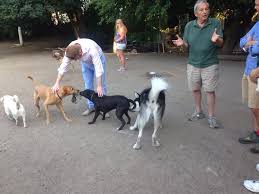
Please visit and LIKE / FOLLOW our Facebook Page and share with family, friends and on your own Facebook page, and ask them to share further – it is only by working together and sharing knowledge and education that we can improve the lives of dogs and assist owners. We do not inundate you with posts – an average of 5 per week, plus one Tip of the Week, and the odd informative post. Thank You!
Is My Dog "REALLY" Comfortable With Other Dogs?
Guest Article by Anneke Oosthuizen - Canine Behaviourist
Guest Article by Anneke Oosthuizen - Canine Behaviourist

So very often I hear dog owners say “my dog goes to day care, he is well socialized. I don’t understand why he is barking and going crazy on walks or in the park.” Or, “my parents/ children often visit with their dogs and my dog is fine with them, but they try to eat other dogs in the park”.
There is a simple explanation for this: Dog’s do not generalize!
Figgo might be comfortable in an enclosed area with multiple dogs he plays with on a daily or weekly basis. His playtime is supervised and he has free movement to either play or walk away from a friend. He knows these dogs from everyday play in the same area and he is comfortable with them.
What Figgo is not comfortable with is walking down the street (change of location), attached to a lead (feeling of no escape) and having unknown dogs (strangers) bark at him and/or his owner.
Figgo is not okay being in a park (change of location) surrounded by unknown dogs (strangers).
He needs to fend for himself and/or his owner. Very often in parks because the dog is perceived to be reactive he is put on lead (feeling of no escape), so now we are adding restriction as well. All of these (change of location, strangers, feeling of no escape) are adding onto the stress levels and in turn the dog is “lashing out” by being reactive. (This does not mean that you should let your reactive dog off lead to meet strange dogs. Introductions should always happen on lead, but with the appropriate behaviour modifications having been done first!)
Let’s put this in human perspective:
You are in your late 30’s or so, you enjoy a quiet get together or ‘n braai with a few selected friends. This is your known, your comfort zone. This is your routine every weekend and it is your safe space.
Now, let’s take you to a dance club (change of location) with lots of people in their 20’s (strangers). It’s an over crowded space (feeling of no escape); music is so loud you can’t hear yourself think and barely able to communicate with your partner. You don’t know anyone there. People are drinking and bumping in to you.
How uncomfortable is this making you feel?
It is still a situation of people around you, but your location is different. This is the first stress point. Your comfort has changed, this is another stress point. Your situation has changed, major stress point added. This is the same for dogs. Every small change is an added stress factor. Just as some humans are naturally sociable and others not, this too applies to dogs
Unlike us humans who can distinguish humans as humans regardless where we are, dogs do not generalise and understand that dogs are just dogs regardless where they are.
This is just taking our dogs into consideration. We are not even beginning to talk about the account of other dogs and whether or not their body language may be interpreted by your dog as aggressive or a threat, even if very slightly.
If dogs were raised by only going to a specific place with specific dogs, this is their norm and what they are used to. This is their small weekend gathering braai with selected friends. They are unable to grasp the simple concept that other dogs in the park might be friendly and want to play.
We as owners need to teach our dogs that it is okay to be in different places with different dogs (or other animals) at various times. This is part of the socialization training as puppies, at their crucial socialization period of 16 – 18 weeks, and we need to continue this training throughout the dog’s life. If your dog is already older and reactive then consult with a behaviourist on how to train and teach your dog how to remain calm and accept strangers in different environments.
There is a simple explanation for this: Dog’s do not generalize!
Figgo might be comfortable in an enclosed area with multiple dogs he plays with on a daily or weekly basis. His playtime is supervised and he has free movement to either play or walk away from a friend. He knows these dogs from everyday play in the same area and he is comfortable with them.
What Figgo is not comfortable with is walking down the street (change of location), attached to a lead (feeling of no escape) and having unknown dogs (strangers) bark at him and/or his owner.
Figgo is not okay being in a park (change of location) surrounded by unknown dogs (strangers).
He needs to fend for himself and/or his owner. Very often in parks because the dog is perceived to be reactive he is put on lead (feeling of no escape), so now we are adding restriction as well. All of these (change of location, strangers, feeling of no escape) are adding onto the stress levels and in turn the dog is “lashing out” by being reactive. (This does not mean that you should let your reactive dog off lead to meet strange dogs. Introductions should always happen on lead, but with the appropriate behaviour modifications having been done first!)
Let’s put this in human perspective:
You are in your late 30’s or so, you enjoy a quiet get together or ‘n braai with a few selected friends. This is your known, your comfort zone. This is your routine every weekend and it is your safe space.
Now, let’s take you to a dance club (change of location) with lots of people in their 20’s (strangers). It’s an over crowded space (feeling of no escape); music is so loud you can’t hear yourself think and barely able to communicate with your partner. You don’t know anyone there. People are drinking and bumping in to you.
How uncomfortable is this making you feel?
It is still a situation of people around you, but your location is different. This is the first stress point. Your comfort has changed, this is another stress point. Your situation has changed, major stress point added. This is the same for dogs. Every small change is an added stress factor. Just as some humans are naturally sociable and others not, this too applies to dogs
Unlike us humans who can distinguish humans as humans regardless where we are, dogs do not generalise and understand that dogs are just dogs regardless where they are.
This is just taking our dogs into consideration. We are not even beginning to talk about the account of other dogs and whether or not their body language may be interpreted by your dog as aggressive or a threat, even if very slightly.
If dogs were raised by only going to a specific place with specific dogs, this is their norm and what they are used to. This is their small weekend gathering braai with selected friends. They are unable to grasp the simple concept that other dogs in the park might be friendly and want to play.
We as owners need to teach our dogs that it is okay to be in different places with different dogs (or other animals) at various times. This is part of the socialization training as puppies, at their crucial socialization period of 16 – 18 weeks, and we need to continue this training throughout the dog’s life. If your dog is already older and reactive then consult with a behaviourist on how to train and teach your dog how to remain calm and accept strangers in different environments.




